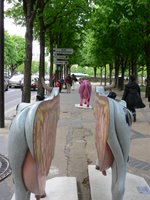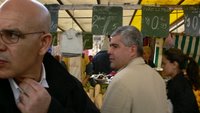
5.08 - Paris
Shakespeare and Company: The second floor, like the first, is humid, and packed with books. These books though, somewhat disconnected from the store downstairs, are part of a private collection, a collection which long ago ceded any hold on more conventional understandings of that word: privacy. I'm reading Italo Calvino's American Diary, the fourth section chronologically (the manner of this particular collection's organization) in an English-language translation of his autobiographical writings, titled fittingly
Hermit in Paris.

Though not quite a hermit, I am in Paris, sitting by an opened window's letting in the breeze, the smell of the rain-laced spring leaves, and the Seine - rolling slightly faster with the recent rain, ensnaring monuments and tourists alike within its pale-green passage. Cars pass on the roads, over the bridge, and under the gothic towering of Notre Dame. Two Italians, a boy and girl, sit beside me, smiling at one another, conversing in a language I do not comprehend, while Italo writes in English, through the medium of Martin McLaughlin.
Were this a different place, I might have had to smuggle the book upstairs. But as it isn't, I walked quietly, book in plain site, up the rickety red-wood passage, the stairs peeling paint, partially hidden, in the back right corner of the shop. They tempt you with the way they wear their footsteps, the many years of traffic, the ascending weight of sightseers and poets, and all the ones who fall - into books of every kind, into enexplicable love with stores that feel, stores of memories on old wood shelves, into the picture-filled lives of Joyce or Hemingway, or two-year-old copies of the New Yorker lying unassumingly beside them on a well-placed desk.
This place... it's a hospice of sorts, a den of invitation, which wears it's motto in a marking, like a mantra: 'Be not inhospitable to strangers, lest they be angels in disguise'.

And, though the initial luster always fades, though the magic of any perfect communion must open itself to economic and practical realities, though you discover, in time, that it is technically 'against the rules' to bring new books upstairs, and though each person that works in such a place is never entirely (or even often) hospitable, the extent of your foreigness fades, and you gather yourself into its rhythms, dirty rhythms which afford you little privacy, but rhythms nonetheless.
And it starts to feel like home...















